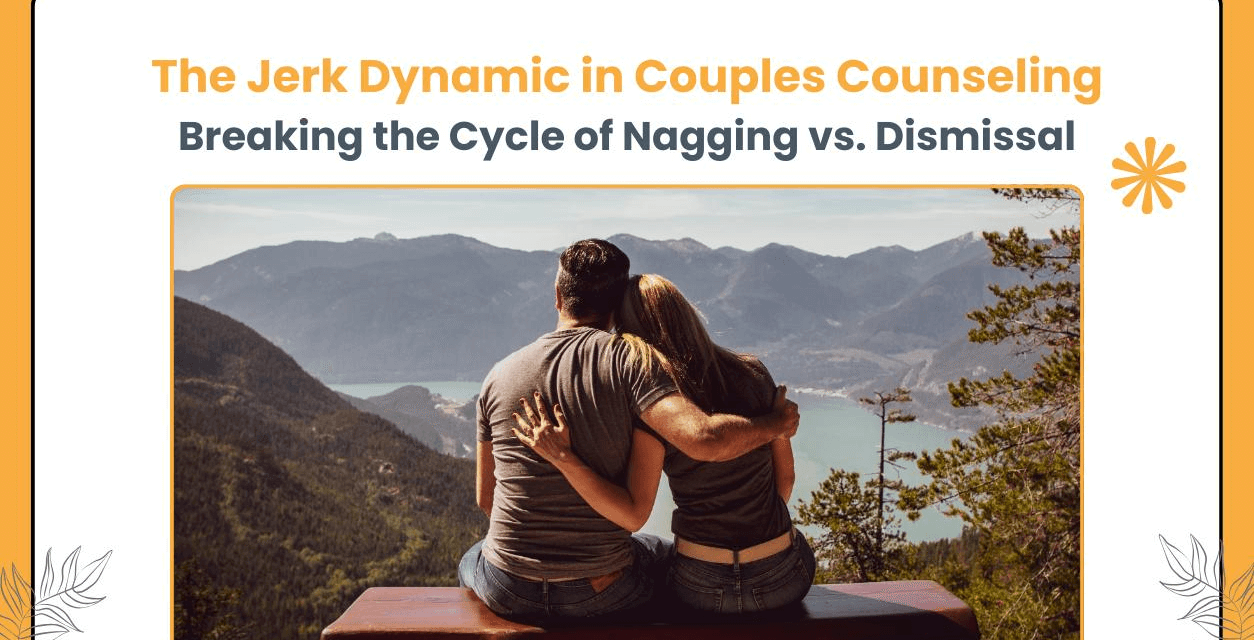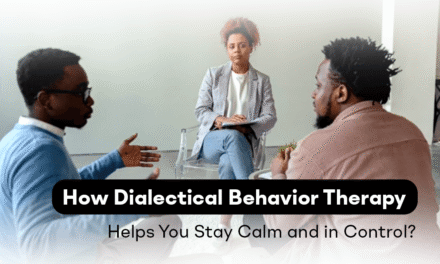In couples counseling, we often discover that the following moments are powered by something deeper: emotional patterns that began long before the two of you met.
You may have heard some couples fighting loudly. And then there are those who do not fight at all. The latter is not such a good thing if they are quietly drifting apart.
In high-conflict couples, there is often an endless loop of nagging vs dismissal. This means that one person keeps pushing an issue by saying, “We really need to talk about this,” and the other shuts it down with “You are making a big deal out of nothing.”
If you have ever been part of such a couple, you probably know the pain is not just about dirty dishes or forgotten plans. In fact, it is about something bigger that has been festering for a while.
Understanding the “Nagging vs. Dismissal” Cycle
I sometimes call this the “jerk dynamic” in couples therapy. Most people believe this is because someone is intentionally being unkind. However, the term stems from the fact that your roles often feel locked in place, almost like a script you cannot stop acting out.
You repeat requests, raise your voice, and feel more urgent each time. Inside, the thought runs, “If I stop asking, nothing will ever change.” What might have started as a calm request can be perceived as pressure or criticism.
You pull back, change the subject, or go silent. Your inner dialogue might sound like, “If I stay in this conversation, it will turn into a fight I cannot win.” The withdrawal is not meant to hurt, but to your partner, it can feel like avoidance or rejection.
This is the essence of nagging vs dismissal in marriage: both partners are reacting to their own fears, yet each response worsens the very problem they want to solve. As time passes, these relationship conflict patterns can become so ingrained that even small disagreements spark big emotional reactions.
One reason the cycle is so damaging is the emotional invalidation in relationships it creates. When the “nagger” feels brushed off, they feel invisible. When the “dismisser” feels constantly pressed, they feel misunderstood.
At the end of the day, the emotional safety erodes, and even loving partners start seeing each other through a lens of frustration and mistrust.
Breaking this loop often requires hard work in therapy, and sometimes, the process gets worse before it gets better. This is because addressing these patterns means touching old wounds, challenging long-held defenses, and learning new ways to respond.
The Role of Early Emotional Scripts in Adult Relationships
An emotional script is like an internal playbook, shaped by childhood emotional patterns in marriage, that silently dictates how relationships are “supposed” to work. These patterns often run on autopilot and guide reactions without conscious awareness. Recognizing them is often the first step toward rewriting the story.
Here are some basic examples.
- If you grew up needing to raise your voice to be noticed, you might naturally repeat that strategy with your spouse.
- If you learned that staying quiet kept you safe, you might see withdrawal as the only way to survive conflict.
A Father's Criticism and Its Lasting Impact
In the case mentioned above, the husband reacted defensively to feedback. The reason being, he had grown up under a hypercritical father who repeatedly pointed out even minor mistakes.
As a result, the husband internalized the belief that any critique meant he was “a jerk.” As an adult, this history turned his wife’s legitimate concerns into perceived attacks and triggered defensiveness and rejection.
Recognizing this link in couples counseling allowed the pair to reframe criticism and opened space for healthier dialogue and the possibility of breaking the cycle.
Internalized Labels and Defensiveness in Marriage
When hurtful labels or judgments are absorbed early in life, they tend to resurface in adult relationships. Internalized criticism from parents can define how partners hear feedback, which could turn even gentle suggestions into perceived attacks.
A spouse who grew up being called “lazy” or “too sensitive” may react defensively, not because the current comment is harsh, but because it echoes old wounds.
This defensiveness creates distance, fuels misunderstandings, and makes constructive dialogue harder.
In marriages, breaking this pattern starts with recognizing when a reaction belongs more to the past than the present. It also entails allowing partners to respond with curiosity instead of automatic self-protection.
Turning Criticism into Connection: Therapy Insights
In healthy couples counseling dynamics, criticism is reframed as an opportunity for understanding rather than a trigger for conflict.
It helps partners slow down these responses, explore the emotional history beneath them, and practice validation. By shifting the focus from blame to curiosity, couples can transform critical moments into opportunities for connection. They can also create a safer environment for honest and productive communication.
Rewriting Relationship Scripts in Couples Counseling
It is true that old emotional habits usually drive misunderstandings, but they can be rewritten with awareness and effort. Rejection sensitivity in marriage can make one partner interpret neutral comments as personal attacks, while the other feels confused or unfairly accused.
These misinterpretations create defensive cycles that block genuine connection. In therapy, couples learn to identify when past wounds are influencing present reactions and to replace automatic defenses with empathy and openness.
Effective therapy for communication issues equips partners with skills to pause, clarify intentions, and respond thoughtfully. Consequently, this allows them to break free from outdated scripts and build healthier and more resilient relationships.
Final Thoughts: From Miscommunication to Mutual Growth
Various relationship struggles stem from old patterns that partners may not realize they are replaying. Understanding how early experiences affect relationships can shed light on why certain triggers feel so intense and why some conflicts seem to repeat endlessly.
With the right tools, these moments can change from points of tension to opportunities for deeper connection.
For this reason, Insight Psychological Group offers couples counselling that creates a safe space to uncover these patterns, practice healthier communication, and foster mutual growth.
If you are ready to break free from old cycles and create a more fulfilling partnership, connect with our therapists and begin your journey today.
FAQs Related to Couples
Why Does My Partner Dismiss My Concerns?
Past experiences often shape present reactions. Trauma responses in relationships can include shutting down during arguments, overreacting to minor issues, or avoiding certain topics altogether. These patterns are protective in origin but damaging over time, keeping partners from fully hearing or trusting each other.
How to Deal With Nagging in Marriage?
When partners feel attacked, whether the intent is there or not, they may respond with defensiveness in couples, taking focus away from the issue and toward self-protection. This reaction blocks resolution and can escalate conflict instead of calming it.
How Couples Therapy Helps With Emotional Reactivity?
Therapists frequently address common issues in marriage counseling, such as communication breakdowns, mismatched expectations, and lingering resentment from unresolved conflicts. Recognizing these themes helps couples normalize their struggles and focus on solutions.
How Emotional Invalidation Affects Relationships?
Cognitive distortions in couples therapy are exaggerated or inaccurate thought patterns, such as “You never listen” or “I am always wrong.” Addressing these distortions helps partners see each other’s intentions more clearly and reduce unnecessary conflict.





